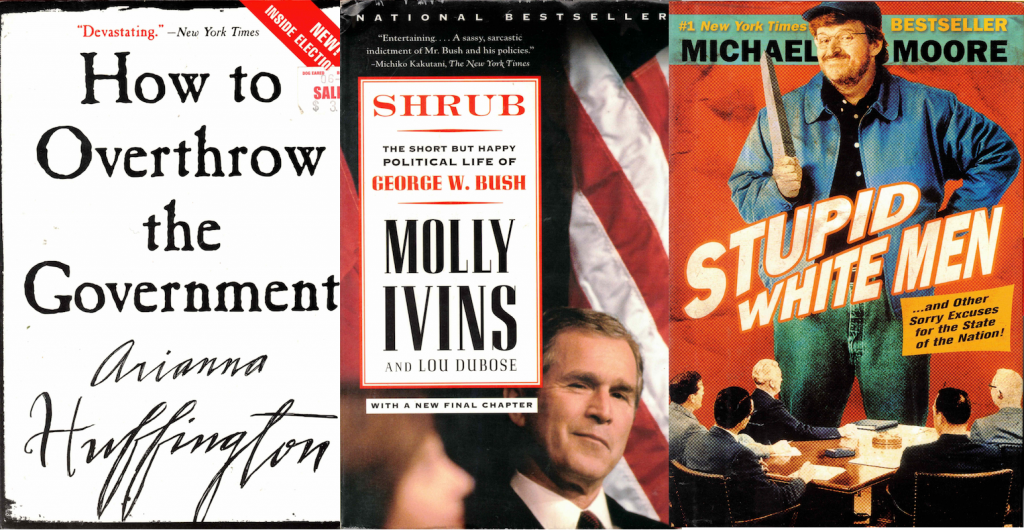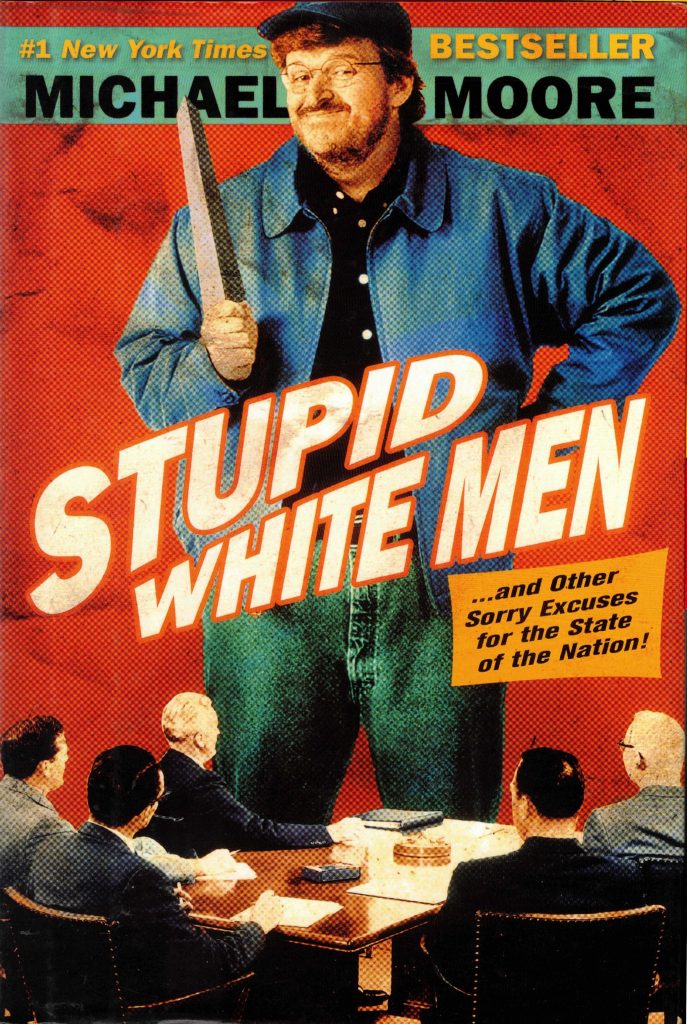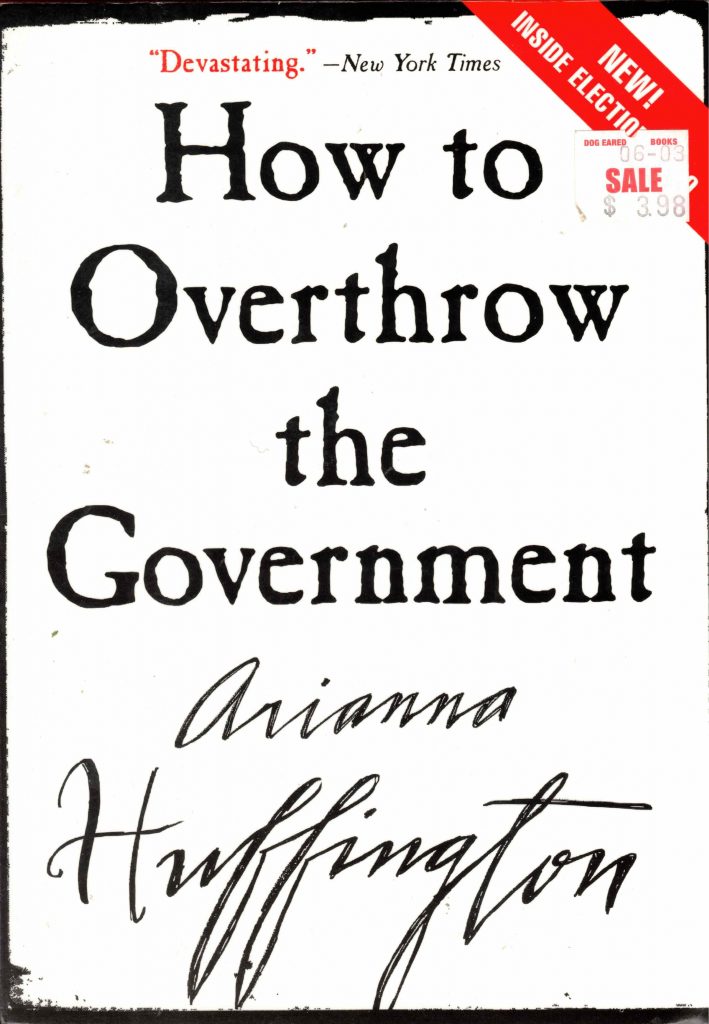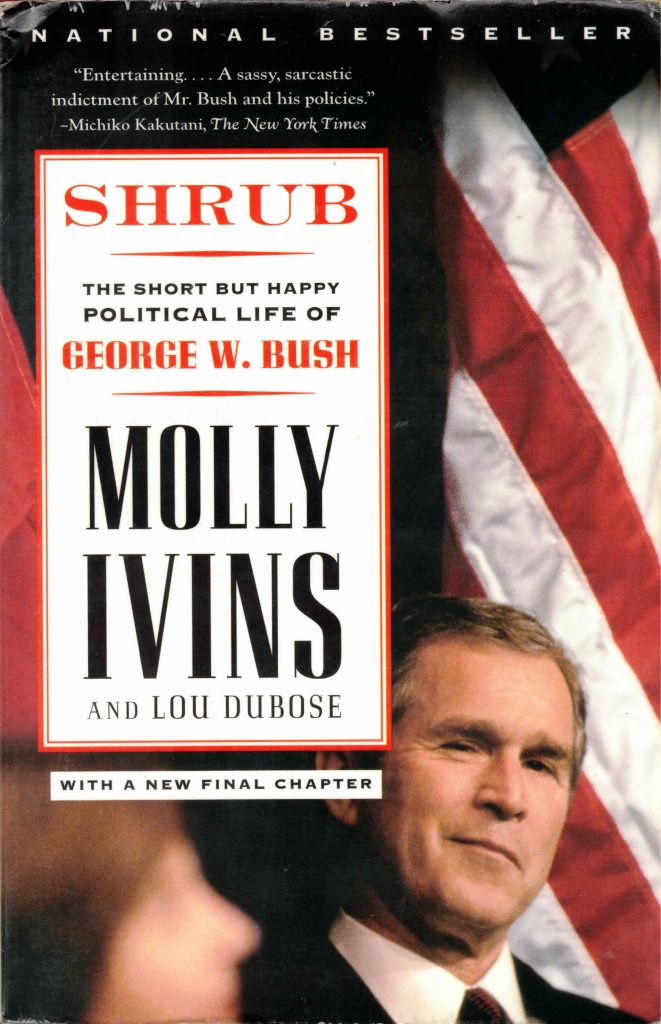I Read It So You Don’t Have To Dept.
How to Overthrow the Government, by Arianna Huffington
Shrub, by Molly Ivins & Lou Dubose
Stupid White Men, by Michael Moore

I have said before that reading political works years after their publication is an instructional exercise. The intervening years make plainer the ingrained biases of both the author and the cultural milieu of which he is a part. When the reader was also a participant in that very milieu, the psychological effects of revisiting the political ‘scene of the crime’ can be quite disconcerting—if you are the type of reader prone to being disconcerted.
Yours Truly is such a reader, and reading these three political works written during the run-up and the follow-up of what was once one of the strangest elections in U.S. history—the Bush-Gore contest of the year 2000—gave me pause as I realized just how naïve we all are when we were younger, no matter how cynical our younger selves believed themselves to be. As well, these three books written in the smoke and fury of that political battle highlight just how crazy our current times have become, whilst also underlining how direct is the line between that mad political season and the present day in the once United States of America. The three books I read recently are as follows: Shrub: The Short But Happy Political Life of George W. Bush, by Molly Ivins & Lou Dubose; How to Overthrow the Government, by Arianna Huffington; and Stupid White Men … and other Sorry Excuses for the State of the Nation, by Michael Moore. The titles themselves may give some indication of my own political bent, for which I make no apology; I do not apologize for my parents, unless I have invited you to dine at my house when they are present. Of the three books, the bio by Ivins & Dubose is the best reported, Huffington’s call to action is the best written, and Michael Moore’s book is the funniest. We’ll look briefly at each in its turn.

Taking the worst first: Moore’s Stupid White Men is a glib attack on the fascistic ideals and actions of the nascent Bush administration in its first few months in power. (By “fascistic” here I refer to that alliance of industry, finance, and the rich (often going by the name ‘big business’) that chooses to view governments as extensions of their own power and which were instrumental in the aiding the Nazis as well as the Italian movement from which ‘fascist’ derives the name.) His heart may (may) be in the right place, but he cannot resist making his stupid little jokes, and his suggestions for remedial or resistive actions are either laughable (though not in the way he intends), impractical, or merely stupid. His focus upon the pro-business, anti-environment, anti-worker ‘accomplishments’ of the Bush administration (pp. 32-36), however, shows plainly how the line from ‘W’ to our own time is much clearer and much more direct than one might like to suppose. Moore lists almost fifty actions taken by the baby government—much less than a full year had passed since Bush’s inauguration—that will sound all too familiar to our putatively more modern ears, including the famous tax cut of which 43% benefitted only the wealthiest 1%. The rest of the book is the usual bite-sized chapters lambasting the new president and the titular Stupid White Men for their usual crimes: oppressing blacks, destroying education and the environment, building more prisons, & c. Not that these are not depredations of some moment, but they were not novel plaints even in the year 2000, and many of the worst actions had begun under Clinton (as Moore himself notes).
The biggest problem for Michael Moore, however, is Septermber 11th. The book was written before the attacks orchestrated by Osama bin Laden, and publication was apparently held up afterwards. Though Moore in some fashion persuaded HarperCollins to release his work in spite of the buoyancy the terrorist assault gave to President Bush, the words already written suffer greatly (that is, even more so than from their poor quality alone) from the altered circumstances. For example, Moore’s opening chapter harp on the fact that George W. Bush is destined to be only a one-term president, as his unpopular actions and the fact that he ‘stole’ the election seem to indicate to Moore. Reading this prophecy now may produce a chuckle (possibly), but Moore shows a poor understanding of the American mass mind, it seems, and his words aged more quickly than McDonalds fries left out all night. Though he hearkens often to his blue-collar roots in Flint, Michigan, Michael Moore’s writing betrays the usual elite dependence upon a staff of researchers and ‘quote boys’, mixed with notional bromides à la Thomas Friedman, as when Moore frames his depiction of increasing disparity among American workers and the rich by referencing his many conversations with airline pilots … as one does. This, along with his quite slippery grasp of facts and figures, make this book just not that worth reading, then or now.

On the other hand, Adrianna Huffington’s jeremiad against the decline of the American ideal, How to Overthrow the Government, is a well-researched, well-written, and well-argued work, full of facts and insights from the best think tanks in the business. The quondam conservative turned liberal activist uses the usual well-reasoned analyses of the problems facing American democracy to present the not quite usual recommendations for approaches meant to ‘take back’ the government ‘of the people’ from those monied interests who have stolen it, apparently. Devotees of The West Wing will find the policy statements quite familiar, as citation after citation is made to this report and that survey and this policy institute’s proposal to fix the increasingly problematic distortions to what once may have been a good system but which now is being severely strained under the continued assault of money and the ever-present ‘special interests’. (If you are not one who has watched The West Wing, just think about those people you knew who were interested in student government in high school; Huffington’s approach is like that.) Published in the last year of the Before Time, 2000 A.D. or C.E. (à votre choix), the trade paper edition includes a preface demolishing the Bush v. Gore decision as a rare glimpse behind the curtain behind which the monied interest usually manipulate the affairs of the United States. In this analysis, as in her savage insights into the so-called ‘War on Drugs’, Huffington demonstrates her brilliance and her ability to perceive clearly just how severely damaged everything has become. She issues a resounding call to battle the forces arrayed against democracy, before it it too late. Alas, as the past score of years have shown, it may already have been too late. Certainly it is much later now than it was when she promulgated the strange ideas in this political book. Unfortunately, most of her suggestions are mere heat lightning or fevered policy dreams, not practical actions that might actually a) be done by real people and b) have any chance of success.
Meanwhile, back in Congress, Senator Mitch McConnell and his friends are thumbing their noses at the future. Like drunks on a bender, they know we’re on the road to political ruin, but don’t have the will to admit they need help.
Huffington unwittingly proves that plus ça change, plus la même chose. Although … twenty years is a pretty long time to continue a bender, even by alcoholic standards.
This was published, of course, long before The Huffington Post found its place among those seeking MSNBC and the Daily Kos as sources of information. Five years before, in fact. Ms. Huffington was exhibiting her ability as a liberal policy wonk, while aptly pointing out the flawed approaches of both parties. In this, she triumphs over the other two works under consideration in this quick report. (Though to be fair, Shrub never claims to look at anything beyond W’s reign as governor of Texas.) Though Michael Moore harps on some of the issues with the Clinton administration, Huffington is devastating in her analysis of how both parties have become beholden to interests which have little to do with the citizens and voters they claim to represent. Unhappily, as I already said, the stratagems she proposes (anonymous campaign donations, ‘none of the above’ choice on ballots, the usual boycotts against stuff we/they don’t like, etc.) either won’t work or won’t happen. I also said this book is the best written, and that’s true. However, it is long, full of the details and data that policy types love, and yet there is nothing new here. I suspect (though I didn’t read this book then, I was not a complete novice politico even two decades past) that there was little new in this volume even when it was published. But perhaps that’s the nature of all political books of this ilk, those that are shelved in ‘Current Events’.
Just as our two-party system is showing unmistakable signs of exhaustion, and the public’s suppressed discontent is ready to be tapped, a disaster in reform’s clothing stands poised to take advantage. Like the townsfolk in an old Western, the millions who feel shut out of our “unprecedented prosperity” may thrill at the sight of a masked man riding to their rescue—until it turns out he isn’t the Lone Ranger, but a racist punslinger bent on turning them against one another.
Huffington is talking about Pat Buchanan, another name that nearly induces nostalgia nowadays.

The last book in our patriotic trio, Shrub, co-written by Molly Ivins and Lou Dubose, is a good example of what real journalism looks like. It doesn’t pull punches, supports all of its contentions, deftly uses telling examples to cut its target down to size (and a pretty small size that is), but is always fair, never overreaching itself, and forthrightly revealing just what it can and cannot prove. Ivins and Dubose humanize George W. Bush in this political biography, while at the same time showing his complete unfitness to be President of the United States. But that, as they point out, has never been a disqualification for the highest office in the land, as we have learned to our dismay. The book may also be a needed anodyne to recent changes in the zeitgeist which may have made Bush fils a better president in memory than he was in fact. Shrub is by far the most entertaining and engaging of the three books reviewed here, though you may learn a bit more about Texas state politics and legislative procedure than you really care to. But trust me, the stories are funny and the reporting is brilliant.
Marshall Kuykendall, a leader of the Texas property-rights movement, was asked a few years ago to cite one single example of the government seizing property without just recompense, since the Constitution expressly forbids this. Well, huffed Kuykendall (and he does huff), what about the Emancipation Proclamation, setting slaves free, taking private property with no compensation whatever to their owners from the feds. Kind of hard to think of a response, isn’t it?
Just one example of the trenchant reportage of Ivins and Dubose.
Of the three books, Shrub is the only one still worth reading today, though you might have to be stuck in a house with no Internet connection and only this book before you’d be likely to pick it up. But that’s mainly because most of us readers have little interest in how the Texas ‘weak governor’ system of state government works, and because interest in how George W. Bush would act as leader of the free world is merely an academic question now. Ivins and Dubose are very clear in their intention to focus solely upon the facts about the Man Who Would Be King, and seek to divine his likely behavior as president by his actions in the role of master of ceremonies for the great state of Texas. All the same, this is a good read, if a tad limited by its self-imposed limitations. Plus, it’s written in Texan, or at least as much of it as can remain comprehensible to us outsiders.
So there was [state senator Drew] Nixon, sentenced to six months in a halfway house, which he worked off a weekend at a time. He made the obligatory postconviction public plea for forgiveness, with his wife at his side, and went for counseling. This remarkable player rose to the occasion late in the session; he told Bush that vouchers are bad public policy and that he would not step aside to let the bill on the floor. Bush had arrived to lean on Senator Nixon personally as the press watched. The man who had raised $20 million for one statewide race, been reelected with 61 percent of the vote, and by this time was widely believed to be the forty-fifth president of the United States had to turn one vote from a member of his own party who is, frankly, a dipshit. Bush couldn’t do it.
Bush tries to do a job he was elected to do.
So would I recommend you read political books twenty years out of date? No, I categorically would not, unless you are researching biographical or historical details. Otherwise, I would advocate the opposite, and even then some. I strongly suggest instead that you do not read political books at all, of any stripe. There may be a handful of well-written books worth reading for that fact alone (I am reliably informed that Obama’s books are exemplars of compelling English), but the vast majority of such works are not worth your time.
Why, then. would I subject myself to three (!) books of this type? To be honest, besides the fact that I am a catholic omnivore when it comes to reading, I find that I have to have some subject matter in the smallest chamber in my house, to which I am forced to withdraw from time to time by nature’s necessities. And I need reading material of which I can read either a page or two or longer passages as the situation requires, without having to worry that the fascination of the book will induce too long a sojourn which might tend to cause piles. These books fit that bill admirably, and I can recommend them to you on that basis, and that basis alone.
Leave a comment